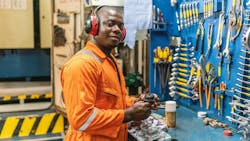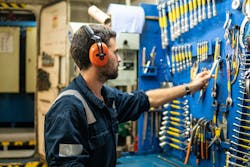Are you paying attention to hearing protection in the shop?
According to the Centers for Disease Control, at least 24 percent of hearing loss cases in the U.S. are caused by workplace exposure.
Proper hearing protection is essential for people working in loud environments, including auto shops. From the roar of engines and vacuums to the whirring of saws and drills, these places are rarely quiet.
If you aren’t currently prioritizing your hearing, it’s time to start. Learn more about the importance of hearing protection and how to protect your hearing from auto-shop noise below.
Why hearing protection matters
Hearing protection is critical for people of all ages — but especially those working in loud conditions.
Long-term exposure to loud noises damages the sensitive structures of the inner ear. It can cause conditions like noise-induced hearing loss (or NIHL) and tinnitus (ringing or buzzing in the ears).
Even short-term exposure can cause lasting damage. For example, if someone hears a gunshot at close range, they could experience immediate and permanent hearing damage.
How loud is too loud?
Units called decibels are used to measure sound. Sounds ranging from 60-70 A-weighted decibels (or dBA) or less are generally considered safe.
Many noises frequently heard in an auto shop far exceed the 60-70 dBA range. Below is a list of everyday noises and their decibel level:
· Gun shot: 160 – 170 decibels
· Jet engine: 150 decibels
· Rock concert: 120 decibels
· Chainsaw: 115 – 120 decibels
· Diesel truck accelerating: 114 decibels
· Ambulance siren: 112 decibels
· Car horn: 110 decibels
· Motorcycle: 105 decibels
· Lawn mower: 94 decibels
· Underground train station: 90 decibels
The National Institute for Occupational Safety and Health (or NIOSH) states that workplace noise exposure should be lower than 85 dBA to minimize the risk of occupational noise-induced hearing loss.
Signs of potential hearing damage
If someone works in an auto shop and doesn’t protect their hearing correctly, he or she may experience signs of hearing loss sooner or later. Here are some of the most common signs of hearing loss to watch for:
· Speech and sounds are muffled
· Difficulty hearing high-pitched sounds (doorbell, telephone, etc.)
· Difficulty understanding conversations in noisy places like restaurants
· Difficulty understanding speech when talking on the phone
· Difficult hearing consonants (difference between s and f, p and t, etc.)
· Frequently asking others to speak more slowly or clearly
· Frequently asking others to speak more loudly or repeat themselves
· Frequently turning up the volume
· Ringing in your ears
· Hypersensitivity to certain sounds
If you notice any of these signs, you should get your hearing tested by a healthcare provider right away.
How to protect your hearing from auto shop noise
Because so many sounds heard in an auto shop exceed the 85 dBA limit, it’s imperative that you protect your hearing while working. Here are some tips that can help you reduce the risk of hearing damage:
Wear hearing protection devices
The first step to protecting your hearing is to wear hearing protection devices. For example, you might choose high-quality reusable earplugs or earmuffs (heavy-duty ones, not the ones you wear outside during the winter) to block out loud noises while you work.
When choosing hearing protection devices for yourself or your colleagues, pay special attention to their noise reduction rating (or NRR). A device’s NRR tells you how well it will protect your hearing.
A noise reduction of at least 30 percent is best for loud environments like auto shops. The Occupational Safety and Health Administration recommends choosing devices that reduce noise levels by 50 percent.
Invest in quieter machines or equipment
If you’re in a leadership position and have some control over the type of equipment you use in the auto shop, look for quieter machines and equipment when possible.
For example, you might choose dampened grinding discs, silenced air compressors, or silenced air tools. Quieter versions don’t exist for every piece of equipment you and your team use, but you can still look for opportunities to reduce noise levels when you can.
It’s also helpful to look for machines and equipment that specify the noise level they produce. Keeping this in mind while shopping allows you to make informed decisions about when you require employees to use hearing protection devices.
Isolate loud noises to specific areas
Depending on the amount of space available in your auto shop, you may want to arrange things so that the loudest activities take place in a different part of the building.
Isolating loud noises to specific areas may help to reduce the total amount of time people are exposed to potentially dangerous sound levels.
Use signs to indicate when hearing protection must be worn
In areas where sound levels exceed 85 dBA, or when certain pieces of equipment are going to be used, use signs that let everyone know they need to start wearing their hearing protection devices.
You might have an electric sign in your shop that quickly catches everyone’s attention and tells them to put on earmuffs or earplugs. You can also place signs over areas where loud equipment is stored, so people know to wear their hearing protection devices before they enter.
Offer hearing protection training
Make sure your employees know the importance of hearing protection — and how to protect their hearing effectively at work.
Offer hearing protection training on their first day on the job, and offer ongoing training reminders to keep everyone up to date. Teach them which hearing protection devices they should use, how to use them correctly, etc.
It’s also important to share the signs of potential hearing loss with your team. The sooner they catch these signs, the sooner they can see a medical professional and learn how to prevent them from getting worse.
Start protecting your hearing today
It doesn’t matter if you’ve started experiencing signs of occupational hearing loss or if you want to prevent it from happening. Either way, it’s imperative that you begin taking steps to protect your hearing from auto shop noise.
Follow the guidelines discussed above so you can reduce your risk of hearing damage while on the job.
About the Author

Rick Farrell
President
Rick Farrell is North America’s foremost expert in improving manufacturing group communication, education, training and group hospitality processes. He has over 40 years of group hospitality experience, most recently serving as president of PlantTours for the last 18 years. He has provided consulting services with the majority of Fortune 500 industrial corporations improving group communication dynamics of all types in manufacturing environments.

